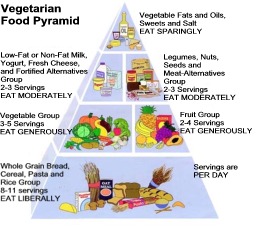|
|
Vegetarian Health
Nutrition Fact Sheet
This Vegetarian
Health Nutrition Fact Sheet can help you pinpoint the most
important nutrients to consider while planning a nutritious
vegetarian diet.
Basic Nutrition for Vegetarian
Health
The three main
components of any diet are:
-
Carbohydrates -
which are found liberally in legumes, grains, fruits and vegetables. In general, anyone eating adequate calories
doesn't need to worry about getting enough carbohydrate
nutrition on a
vegetarian diet.
-
Protein - you need
to eat eight different types of amino acids – the building
blocks of protein. Most plant foods don’t include all eight
essential amino acids, so they are considered as ‘incomplete’
protein sources. A varied vegetarian diet does include
them all – just from different sources. Your body keeps a pool
of the amino acids it needs, so be sure to eat a variety of different
high-protein foods through the day. Good vegetarian sources of
protein include legumes (such as beans, lentils and peas), nuts,
seeds, grains, soy products (tofu, soy milk, veggie burgers,
etc.), dairy products and eggs.
The recommended daily allowance (RDA) of protein for good health is 0.8 g
(grams) per kg of body
weight. For example, a 130 pound sedentary adult needs 47 g of protein per
day. This nutrition requirement increases with activity, and an adult who exercises
regularly needs about 70 g of protein per day.
-
Fat - found in
vegetables oils, salad dressings, mayonnaise, nuts, seeds, dairy products and
in most baked goods. The
omega 3 essential fatty acids found in oily fish are also found
in rapeseed oil, flax seeds and walnuts.
Various vitamins and
minerals are also important to human health. A well-balanced
vegetarian diet can supply most or all of the nutrition that's needed,
especially if fortified foods are chosen regularly. A
comprehensive vitamin and mineral supplement would be good
insurance for anyone on a vegetarian diet.
Vegetarian Health
Nutrition Fact Sheet
Vegetarian Diet Daily Guidelines
Bread, Grain, Potatoes
5+
servings a day
Base most of your meals on
these foods. Use wholegrain versions as much as possible and
avoid adding lots of fat. These foods provide carbohydrates
for energy, fiber, protein and some vitamins and minerals.
Vegetable Protein Sources
2-3 servings a day
Include a variety of legumes (also known as pulses - beans,
chickpeas, soy products, etc.), nuts, seeds, and eggs for
protein, minerals and vitamins. |
 |
Milk and Dairy Products
2-3 servings a day
Good sources of calcium, protein and some vitamins. If you are
avoiding dairy foods, choose fortified soy, rice or oat drinks
or make sure that you eat other foods that are high in calcium.
Fruit and Vegetables
5 or more servings a day
Fresh, frozen, juiced, canned or dried fruit and vegetables are
good sources of vitamins, minerals and fiber.
Fatty and Sugary Foods
0-3 servings a day
Although you need to eat some fat, eat these foods sparingly and
try low-fat alternatives.
There are additional nutrients to
consider when planning a balanced vegetarian diet, which fall
outside of the scope of this vegetarian health nutrition fact
sheet. The so-called 'vegetarian
vitamins' are nutrients that deserve special emphasis
to ensure robust good health while on a vegetarian diet.
With a little forethought and planning, vegetarians can easily
meet all their nutritional needs.

|



